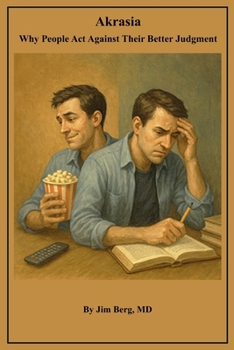Akrasia: Why People Act Against Their Better Judgment
Akrasia: Why People Act Against Their Better Judgment by Jim Berg, MD, examines one of the oldest and most perplexing features of human life: the gap between knowing and doing. From the student who procrastinates to the addict who relapses, from the spender who squanders savings to the citizen who ignores long-term risks, people repeatedly act against their better judgment. The Greeks called this paradox akrasia, and philosophers, theologians, psychologists, and neuroscientists have wrestled with it ever since. Across its chapters, Akrasia explores the divided self, the tension between reason and desire, and the many explanations-ignorance, weakness, sin, bias, and brain circuitry-that have been offered. Along the way, it shows how akrasia shapes daily choices about work, food, money, relationships, and time, and how cultures themselves fall into collective folly despite knowing better. More than a chronicle of failure, Akrasia: Why People Act Against Their Better Judgment offers insight into strategies of self-mastery. Drawing on ancient virtue, religious discipline, therapeutic practice, and modern behavioral tools, Jim Berg, MD, presents ways of narrowing the gap between knowledge and action. The result is both sobering and hopeful: akrasia may never vanish, but by understanding it, individuals and societies can learn to resist it, transform it, and discover within the struggle the dignity of being human.
Format:Paperback
Language:English
ISBN:B0FW4ZCR8Z
ISBN13:9798269619477
Release Date:October 2025
Publisher:Independently Published
Length:144 Pages
Weight:0.44 lbs.
Dimensions:0.3" x 6.0" x 9.0"
Customer Reviews
0 rating





